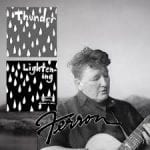Grammy nominated Rahim Alhaj – oud master and Iraqi refugee records culture bridging album
Little Earth
By Rahim Alhaj
Review by Doug Heselgrave
Iraqi oud master given asylum in New Mexico makes a compelling album about the universality of music with musicians from around the world
Most victims of war are invisible. The ninth anniversary of the 9/11 attacks has come and gone – America is stuck in two wars that history has shown us are unwinnable, and as a Canadian, I still listen to the radio each morning hoping that I won’t hear about the latest roadside mortar attack that has claimed another young ‘peacekeeper’ sent by my government to make sense of the chaos in modern Afghanistan.
Every Canadian soldier who has lost his or her life in the conflict is profiled in the media, and each death understandably makes us wonder why our government is sending its young people halfway across the world to fight a war that is not of our making. Their deaths – and the deaths of all western soldiers engaged in the conflict – are commemorated, and their families are given some slight comfort that they have given their life for a worthy cause.
But, the incalculable suffering of the average citizens of Afghanistan and Iraq who have endured seven or more years of war in their homelands goes largely unnoticed by the world at large. That is something that Rahim Alhaj, an Iraqi oud player who has lived in New Mexico since 2000 would like to change.
Alhaj, himself, is no stranger to persecution. When he set a friend’s poem to music to create a song of resistance appropriately titled ‘Why?’ it spread by word of mouth throughout Iraq, and was sung by people throughout the region. It had become the defining Iraqi song of the era and Alhaj was rewarded with his own cell in one of Saddam’s prisons. When he was finally released in 1991 during the first Gulf war, he made it to the border of Syria only to have his instruments confiscated as he fled. He spent several unsettling years drifting between Syria and Jordan before he was accepted as a refugee in America.
Since arriving in the States, Alhaj has been embraced by the country’s musical community and his career has taken off. His Smithsonian Folkways recording of traditional music ‘When the Soul is Settled: Music of Iraq’ was nominated for a Grammy in 2008, and his last album, ‘Ancient Sounds’ a duet with Amjad Ali Khan was also nominated for a 2010 Grammy in the Best Traditional World Music Recording Category. Each of these is certainly worth hearing, and both have opened my ears to the diverse musical traditions of the Middle East.
‘Little Earth’ is Alhaj’s eighth album and is his most ambitious project so far because this time around he’s branched out from his traditions to interact with musicians from America, Africa, Europe and Asia. The results are not surprisingly a little uneven, but there is much to recommend in this two CD set.
To Rahim Alhaj’s advantage, the oud or lute’s sound is not unfamiliar to the western ear, and its tones fit in well with most of our string music traditions. Bluegrass and jam band fans will hear commonalities between Alhaj’s playing and that of western masters such as David Grisman or Bela Fleck. The music itself – however loose sounding it may appear – is not jam based, and each composition in this set has been composed and annotated in the Arabic tradition. The challenge, then, was how to get players from other cultures to play within an Iraqi musical framework while honouring their own traditions to create music that is a synthesis of the various players’ backgrounds.
Thankfully, while studying Magam – the traditional Iraqi song form – as a young person, Alhaj was also instructed in western classical music, so ‘Going Home’ and ‘Sama’I Baghdad’ the two compositions written as complex chamber pieces for the Little Earth Orchestra come off without a hitch. Careful listeners will hear lots of musical ‘in jokes’ as Alhaj continually plays with western classical forms to set up his listeners for crescendos and climaxes that never arrive. If this sounds too clever or academic for you, rest assured that Alhaj’s playing is graced with such verve and humour that the pieces never drag or get bogged down by their own cleverness.
Acoustic music fans will naturally be drawn to ‘Fly Away’ a collaboration between Alhaj and the Santa Fe Guitar quartet. The lovely interplay between the guitars and the oud reveals a musician who is completely confident in his playing as he explores the subtle tonal variations within the piece. Equally mesmerising is ‘Morning in Hyattsville’ which features Bill Frisell on electric guitar and Laurie Anderson alumnus, Eyvind Kang on viola. Alhaj’s personal friend and REM guitarist, Peter Buck makes an appearance on ‘Athens to Baghdad’ – a track which joyfully explores and asserts the universal nature of music making.
String players will bask in the simple clear beauty of ‘Rocio’ a duet with Rhoshan Jamal Bartiya on sitar and ‘The Other Time’ which features Yacouba Sissoko, the Malian master musician on the kora. Both of these tracks sound utterly unaffected; there is no evidence of strain or over-reaching anywhere in this collection, and one is continually struck by the relaxed and natural conversations between instruments.
The only overtly political track is ‘Qaasim’ and it is not surprisingly the most powerful piece of music on the album. It is a composition that tries to make sense of the loss brought about by war as it commemorates the life of Alhaj’s cousin who was killed during the most recent US occupation. Featuring the insistent sounds of Stephen Kent’s didjeridoo, it is a low rhythmic piece that emulates an Iraqi woman’s cries of grieving and loss.
For most of us, Middle Eastern music still sounds foreign and difficult to appreciate. Like many other forms of traditional music from reggae to salsa, the untrained ear often finds it challenging to move beyond rhythms that seem indistinguishable from one another when we first encounter the songs, but albums like this one go a long way towards bringing music from the region to us in a way that we can appreciate and understand. ‘Little Earth’ is an important release that deserves a wide audience.
This article also appears at www.restlessandreal.blogspot.com
Sign up for free updates




